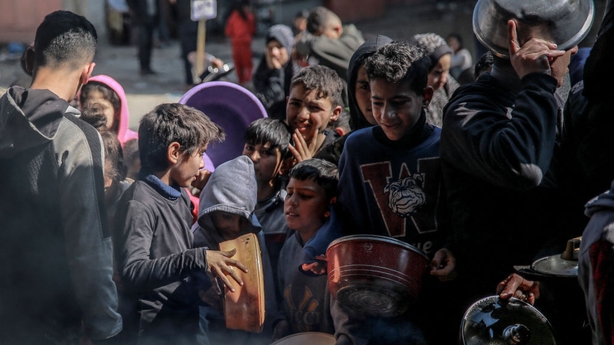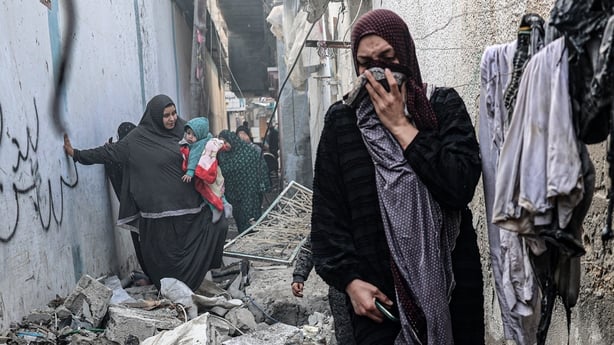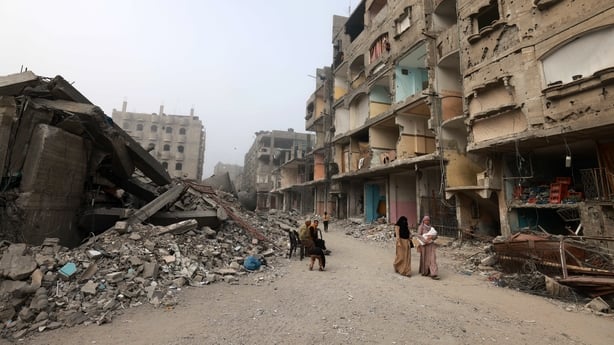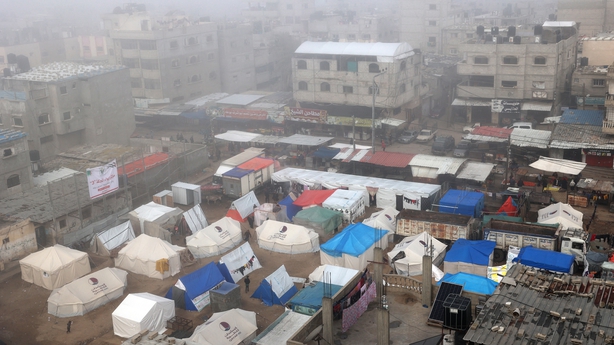A full-scale Israeli military operation in Rafah would deliver a death blow to aid programmes in Gaza, where humanitarian assistance remains "completely insufficient", the UN chief has warned.
Speaking before the UN Human Rights Council in Geneva, Antonio Guterres said that Gaza's southernmost city, where more than 1.4 million Palestinians are crowded together in tent cities, was "the core of the humanitarian aid operation" in the Palestinian territory.
"An all-out Israeli offensive on the city would not only be terrifying for more than a million Palestinian civilians sheltering there; it would put the final nail in the coffin of our aid programmes," he said.
His comments came after Israeli Prime Minister Benjamin Netanyahu reiterated that his country was intent on a ground invasion in Rafah, in its bid for "total victory" over Hamas, whose 7 October attack triggered the war.
He said that once a ground invasion happens, victory would be just "weeks away", and that a potential ceasefire, being discussed in Doha, would only delay the operation.
'End the bloodshed'
Mr Guterres stressed that "nothing can justify Hamas's deliberate killing, injuring, torturing and kidnapping of civilians, the use of sexual violence - or the indiscriminate launching of rockets towards Israel".
"And nothing justifies the collective punishment of the Palestinian people," he said.
He lamented that despite his urgent calls for the UN Security Council to take all measures to "end the bloodshed in Gaza and prevent escalation", it had failed to act.
As one of five permanent members of the 15-member council, the United States - Israel's biggest ally - has a veto that it has wielded three times so far to bar the body from calling for an immediate ceasefire in Gaza.
Mr Guterres warned of the consequences of the council's lack of action on Gaza, and its failure, due to a Russian veto, to act on the war in Ukraine.

Mr Guterres stressed that "humanitarian aid is still completely insufficient".
"I repeat my call for a humanitarian ceasefire and the immediate and unconditional release of all hostages," he said.
'Proximity' talks held in Qatar
Israeli officials headed to Qatar today, where the ruling emir separately met the chief of Hamas, as the enemies in the Gaza war closed in on a ceasefire-and-hostage deal that Washington says is now within reach.
The presence of both sides for so-called proximity talks, meeting mediators separately while in the same city, suggested negotiations were further along than at any time since a big push at the start of February, when Israel rejected a Hamas counter-offer for a four-and-a-half-month truce.
In public, both sides continued to take positions far apart on the ultimate aims of a truce, while blaming each other for holding up the talks.
Israel has said it will agree only to a temporary pause in fighting to secure the release of hostages. Hamas says it will not free them without an agreement that leads to a permanent end to the war.
After meeting Qatar's Emir Sheikh Tamim bin Hamad Al Thani, the reclusive head of Hamas, Ismail Haniyeh, said his group had embraced mediators' efforts to find an end to the war, and accused Israel of stalling at while Gazans die under siege.
"We will not allow the enemy to use negotiations as a cover for this crime," he said.
Israel's Prime Minister Benjamin Netanyahu said Israel was ready for a deal, and it was now up to Hamas to drop demands he described as "outlandish" and "from another planet".
"Obviously, we want this deal if we can have it. It depends on Hamas. It's really now their decision," he told US network Fox News in an interview. "They have to come down to reality."
The office of Qatar's emir said Al Thani and the Hamas chief had discussed Qatar's efforts to broker an "immediate and permanent ceasefire agreement in the Gaza Strip".
'No aid'
Dire food shortages in northern Gaza are "a man-made disaster" that can be mitigated, said Philippe Lazzarini, head of the UN agency for Palestinian refugees, UNRWA.
"Famine can still be avoided through genuine political will to grant access and protection to meaningful assistance."
The UN has said it faces restrictions, particularly on aid deliveries to northern Gaza.

Nearly five months into the war, desperate families in Gaza's north have been forced to scavenge for something to eat.
"We have no food or drink for ourselves or our children," Omar al-Kahlout told AFP, as he waited near Gaza City for aid trucks to arrive.
"We are trapped in the north and there is no aid reaching us - the situation is extremely difficult."
Hundreds of Palestinians headed south whichever way they could, walking down garbage-strewn roads between the blackened shells of bombed-out buildings, said an AFP correspondent.
Israeli forces have continued striking targets across the Palestinian territory, with the Hamas-run health ministry saying early Monday that 92 people were killed overnight.
Israel's military campaign has killed at least 29,782 people in Gaza, mostly women and children, according to the Hamas-run territory's health ministry.
The war broke out after Hamas's unprecedented attack, which killed about 1,160 people in Israel, mostly civilians, according to an AFP tally of official figures

'Expanding the conflict'
Militants also took about 250 Israeli and foreign hostages, 130 of whom remain in Gaza, including 31 presumed dead, according to Israel.
Israel's army confirmed yesterday the death of soldier Oz Daniel, 19, whose "body is still held captive", according to the Hostages and Missing Families Forum, which said he was killed on the day of Hamas's attack.
Mediators have voiced hope that a temporary truce and a hostage-prisoner exchange can be secured before the start of Ramadan on 10 or 11 March, depending on the lunar calendar.
Jordan's King Abdullah II warned fighting during the holy month "will increase the threat of expanding the conflict", according to a royal statement.
Qatar's Emir Sheikh Tamim bin Hamad Al-Thani, whose country hosts Hamas leaders and had helped broker a one-week truce in November, is due in Paris this week, the French presidency said.
Media reports suggest the warring parties are weighing a six-week halt to fighting and the initial exchange of dozens of female, underage and ill hostages for several hundred Palestinian detainees held by Israel.

Hezbollah threat
Across from overcrowded Rafah, neighbouring Egypt has kept its border closed, saying it will not help facilitate any operation to push Palestinians out of Gaza.
But satellite images show it has built a walled enclosure next to Gaza, in what is feared to be an effort to brace for the possible arrival of large numbers of refugees.
Inside Israel, pressure has grown on Netanyahu from families of hostages demanding swifter action, and resurgent anti-government protests.
Defence Minister Yoav Gallant said there would be no let-up in action against Hamas's powerful Lebanese ally Hezbollah, whose militants have traded near-daily fire with Israeli forces since early October.
Both Hamas and Hezbollah are backed by Israel's enemy Iran.
"If anyone thinks that when we reach a deal (with Hamas)... it will ease what is happening here - they are wrong," he said.

